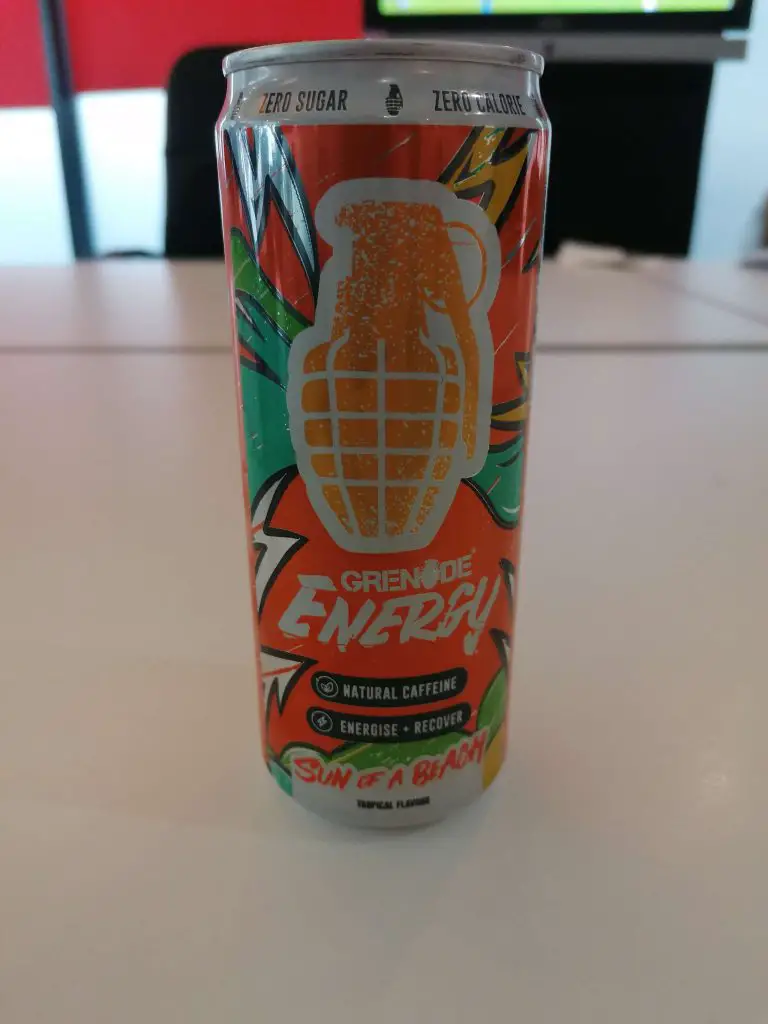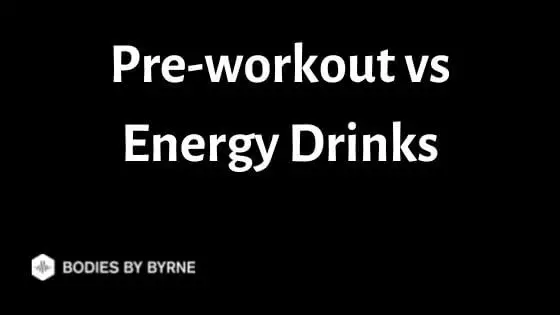What you do before a workout is almost as important as the workout itself.
That’s why most people’s workout routine now includes some sort of pre-workout supplementation, on top of the expected warm up and motivating tunes.
Supplement companies have jumped onto this, with literally thousands of pre-workout formulas available, the advertising on each one promising to give you an even bigger boost of energy, push you to hit new PRs and work harder, with no downsides…
While pre-workouts are the marketable “workout product”, other people are turning to energy drinks to deliver a quick hit of caffeine and sugar instead.
Energy drinks are including more and more performance based ingredients which has started to minimize the differences between pre-workouts and energy drinks.
Both have the pros and cons but which one is better, and is it actually possible to substitute one for the other? In this article we’ll put pre-workout vs energy drinks head to head to show which is the best energy source to take before a workout.
What Is the Difference Between Pre-workouts and Energy Drinks
If you’re relatively new to training, the marketing used for pre-workouts and energy drinks can be very similar. The bottom line is that both pre-workouts and energy drinks are supposed to give you energy.
Energy can be mental focus or a boost to physical energy through caffeine or other stimulant based ingredients. The Collins dictionary definition of physical energy is the following:
“Energy is the ability and strength to do active physical things and the feeling that you are full of physical power and life.”
The most important distinction to make and the key difference between pre-workouts and energy drinks is that an energy drink is designed to provide an energy boost whereas a pre-workout is designed to enhance workout performance.
While people will take energy drinks and pre-workouts to study, work, play games, and workout, a pre-workout is specifically designed it increase training performance through energy, endurance, and strength related metrics.
This is due to the active ingredients used in a pre-workout and below we’ll look into these in a little more detail.
What’s in a Pre-workout
Most pre-workout brands follow the same standard formula. There are four main active ingredients in almost every pre-workout on the market. Why? Because they’re proven to work.
Caffeine
Yes. Caffeine.
The same caffeine you get from your cup of morning coffee has a ton of beneficial effects when it comes to fitness.
Everyone is aware of the boost to energy, focus and mental clarity that caffeine brings.
But many are probably unaware that caffeine also readies the body, increasing muscular endurance and letting you work harder, and may also have benefits when it comes to heavy exercise and power output.
Creatine
Many people already supplement with creatine. It’s one of the simplest supplements to use, requiring a single dose per day, (with an optional short loading cycle where you take a larger dose).
But the benefits when it comes to muscular endurance and ability to keep working when your energy systems would usually fail is incredibly beneficial.
Hence why creatine is one of the most researched, tested, and used supplements in the health and fitness industry.
Creatine is the energy source of your muscles, and having more bio-available creatine lets you keep pushing past your normal boundaries, hit PRs and break plateaus that were otherwise insurmountable.
BCAAs
Branch Chain Amino Acids (BCAAs) are the essential components of the proteins that make up your muscles.
Supplementing with BCAAs has been shown to increase muscular endurance, as well as having huge effects on recovery time and muscle growth.
Beta-Alanine
Another amino acid, Beta-Alanine helps boost muscular endurance, reduce fatigue, and also helps fight against the long term effects of working out by increasing anti-oxidants and anti-aging compounds.
Nitric Oxide
Nitric oxide is a molecule that causes vasodilation of the blood vessels. What this means is that it widens blood vessels to increase blood flow. The key benefit of this when training is that you get a significantly better muscle pump.
While the energy boost is a primary benefit of pre-workouts, many people will take a pre-workout if it’s known to contain a good pump formula, especially if you struggle to get a pump in the gym and this is where nitric oxide ingredients like arginine and citrulline malate will be included.
Non-Stimulant Pre-Workout
It’s also worth noting that you can now get non-stimulant pre-workouts. These specific supplements have no stimulants which can cause energy crashes and jitters but still provide nootropic effects for mental focus, clarity, and pumps.
For more info, check out our guide on stimulant vs non-stimulant pre-workouts.
What’s in an Energy Drink?
The two main components of an energy drink shouldn’t be a surprise to anyone. Caffeine, and sugar.
Many energy drinks will also contain smaller quantities of chemicals like taurine, which help with mental focus and boost energy, but they are not necessarily performance-enhancing.
Caffeine
The benefits of caffeine have already been discussed, and there’s a reason almost all fitness supplements already include a healthy dose.
The increased focus, boosted energy, as well as increased endurance and exercise intensity from a dose of caffeine means that it’s a benefit to any exercise plan.
Sugar
Almost all energy drinks, as well as many ‘sports drinks’ like Lucozade contain a hefty amount of sugar as one of their active ingredients.
While the quick-release energy benefits of sugar are obvious and can be helpful in the short term, it can lead to slumps or crashes in the long term. On top of this, a drink that’s packed with sugars is full of empty calories, and might also cause long-term issues with tooth decay and other dental problems.
There’s nothing wrong with sugar in moderation, but consuming too much has obvious downsides, and should be avoided. Not just because of your fitness, but because of your long-term health, as well.
Other Ingredients
Alongside the key ingredients above, modern energy drinks are becoming more focused on the health and fitness market.
Where brands like Red Bull and Monster focus on the general public, more energy drink brands are offering performance-boosting ingredients specifically to help with training. Bang Energy, NOCCO, and C4 Energy are prime examples of this.
Other ingredients to can expect to find in performance-related energy drinks include:
- Taurine
- Artificial Sweeteners
- Amino Acids
- Citrulline Malate
- Electrolytes
- EAAs
- BCAAs


Pre-Workout VS Energy Drinks
No two pre-workouts or energy drinks will be alike, the active ingredients, taste, flavor, and ultimately the effects you feel will vary from product to product and person to person.
Therefore, before consuming one or the other it’s good to know what the pros and cons are of each as this will help you decide what the best use will be:
What are the Pros of Pre-workouts?
- A quick boost of focus and energy
- More strength and endurance
- A better muscle pump
- Quicker recovery, and less pain the day after
- Better long-term progress due to harder or more intense workouts
What are the Cons of Pre-workouts?
- Taking too much pre-workout can result in side effects and other issues
- Reliance on the buzz or energy provided
- Taste bad
- Losing energy and motivation several hours later
- You can become tolerant to pre-workout
The Pros of Energy Drinks
- Energy drinks are easy to drink
- Most energy drinks taste good and come in a range of flavors
- An energy drink will give you a quick buzz of energy
- Price. Energy drinks are cheap
- Taste good
- Sports drinks and energy drinks are available almost everywhere
The Cons of Energy Drinks
- The high sugar content
- Energy drinks aren’t designed for exercise
- It’s hard to measure specific amounts of an energy drink
- You have to drink a lot of fluid for the effect
Should You Drink an Energy Drink Before You Work Out?
The consensus is clear.
An energy drink might be a decent alternative to a proper pre-workout supplement and can deliver a quick shot of energy, especially if you have no other option and need a quick boost before you lift.
But it’s not a replacement.
If you’re serious about your health and fitness, choosing and regularly using a dedicated pre-workout supplement is always the better option when it comes to performance and effectiveness.
Summary
Pre-workouts and energy drinks can be seen as very similar products. With each year, energy drinks modify their active ingredients and have started to become more and more beneficial for working out.
The bottom line, however, is that pre-workouts are better for workouts than an energy drink because they provide performance-enhancing benefits like muscle endurance, muscle pumps, and an energy boost. This is in comparison to energy drinks which mainly provide an energy boost (though some can have added benefits).
Related – Coffee vs Pre-Workout
